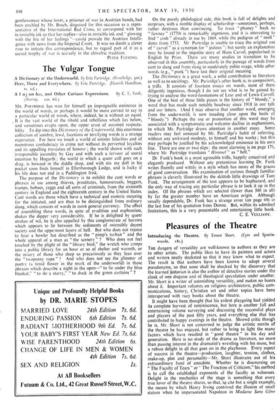The Vulgar Tongue
A Fro.; on Ice, and Other Curious Expressions. By C. E. Funk.
(Murray. los. 6d.)
MR. PARTRIDGE has won for himself an impregnable eminence in the world of words, or perhaps it,would be more correct to say in a particular world of words, where, indeed, he is without an equal. It is the vast world of the ribald and rebellious which lies below, and sometimes erupts upon, the upper crust of assumed respecta- bility. To dip into this Dictionary of the Underworld, this enormous collection of sombre, lewd, facetious or terrifying words is a strange experience. For here we touch a world of sinister hilarities and of monstrous confederacy in crime not without its perverted loyalties and its appalling travesties of honour ; the world shown with such irresponsible jocundity by Gay and with such a fervour of moral intention by Hogarth the world in which a queer cull goes on a drag, is bowzed in the diddle shop, and with nix my doll in his pocket soon finds himself in Ellenborough Lodge, and is lucky if his life does not end in a Paddington frisk.
The purpose of the Dictionary is to exhibit the cant words or phrases in use among thieves, prostitutes, homosexuals, beggars, tramps, hoboes, yeggs and all sorts of criminals, from the sixteenth century in England and the eighteenth century in the United States. Cant words are those which have a technical and esoteric meaning for the initiated, and are thus to be distinguished from ordinary slang, which consists of words in more general currency. The effect of assembling these words, in spite of erudition and euphemism, shakes the dipper very considerably. If he is delighted by queer strokes of wit, he is also appalled by this conglomerate of horrors which appears to lie between the sediments of ostensibly decent society and the uppermost layers of hell. But who does not rejoice to hear a bowler hat described as the " pimp's turban " and the whole apparel of a man as " the scenery " ? Who does not feel touched by the plight of the " library bird," the wretch who creeps into a public library for an hour or so of shelter and warmth, or the misery of those who sleep so pretariously as they lean over the " twopenny rope " ? And who does not see the glimmer of poetry (a timid flower in the murk of the underworld) in those phrases which describe a night in the open—" to lie under the blue blanket," " to do a starry," " to duck in the green curtains " ?
On the purely philological side, this book is full of delights and surprises, with a nimble display of scholarship—sometimes, perhaps, rather dextrous than convincing. To trace " phoney " back to " fawney " (1770) is remarkably ingenious, and it is interesting to find " cosh " already in use by 1869, while the pedigree of " moll " dates from 1753. Mr Partridge is unable to trace the original use of " carvel " as a synonym for " jealous "; but surely an explanation may be found in the impolite story of Hans Carve!, popularised in English by Prior. There are many studies in transition to be observed in this assembly, particularly in the passage of words from cant to slang and from slang to moderately polite usage, while other words (e.g., " punk ") have lost their original meaning.
The Dictionary is a great work, a solid contribution to literature as well as to sociology. Mr. Partridge's other book is, in comparison, a trifle. It consists of fourteen essays on words, most of them diligently ingenious, though I do not see what is to be gained by trying to analyse the word-formations of Lear and of Lewis Carroll. One of the best of these little pieces is the history of " bloody," a word that has made such notable headway since 1918 in our talk and our letters. (And I may observe that another word, emerging from the underworld, is now treading close upon the heels of " bloody.") Perhaps the use or promotion of this word may be associated with a symptomatic and welcome decline in euphemisms, to which Mr. Partridge draws attention in another essay. Some readers may feel annoyed by Mr. Partridge's habit of referring, without any awkward modesty, to himself and his works ; but this may perhaps be justified by his acknowledged eminence in his own line. There are one or two slips: the most alarming is on page 176, where Mr. Partridge translates "Himmel " as " hell."
Dr. Funk's book is a most agreeable trifle, happily conceived and elegantly produced. Without any pretentious learning Dr. Funk writes fluently and wittily in a style which has many of the graces of good conversation. His examination of curious though familiar phrases is cleverly illustrated by the skittish little drawings of Tom Funk. The arrangement of the text appears to be haphazard, and the only way of tracing any particular phrase is to look it up in the index. Of the phrases which are selected (fewer than 500 in all) by far the greater number have an American origin. Although usually dependable, Dr. Funk has a strange error (on page 69) in the last line of his quotation from Donne. But, within its admitted limitations, this is a very presentable and entertaining little book. C. E. VULLIAMY.










































 Previous page
Previous page